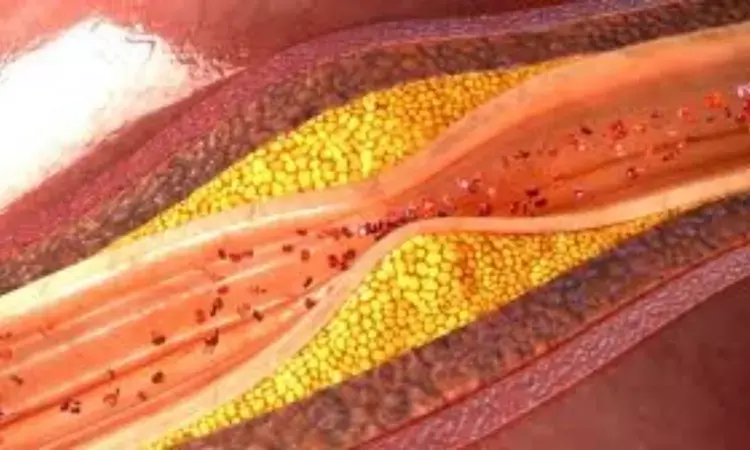- Home
- Medical news & Guidelines
- Anesthesiology
- Cardiology and CTVS
- Critical Care
- Dentistry
- Dermatology
- Diabetes and Endocrinology
- ENT
- Gastroenterology
- Medicine
- Nephrology
- Neurology
- Obstretics-Gynaecology
- Oncology
- Ophthalmology
- Orthopaedics
- Pediatrics-Neonatology
- Psychiatry
- Pulmonology
- Radiology
- Surgery
- Urology
- Laboratory Medicine
- Diet
- Nursing
- Paramedical
- Physiotherapy
- Health news
- Fact Check
- Bone Health Fact Check
- Brain Health Fact Check
- Cancer Related Fact Check
- Child Care Fact Check
- Dental and oral health fact check
- Diabetes and metabolic health fact check
- Diet and Nutrition Fact Check
- Eye and ENT Care Fact Check
- Fitness fact check
- Gut health fact check
- Heart health fact check
- Kidney health fact check
- Medical education fact check
- Men's health fact check
- Respiratory fact check
- Skin and hair care fact check
- Vaccine and Immunization fact check
- Women's health fact check
- AYUSH
- State News
- Andaman and Nicobar Islands
- Andhra Pradesh
- Arunachal Pradesh
- Assam
- Bihar
- Chandigarh
- Chattisgarh
- Dadra and Nagar Haveli
- Daman and Diu
- Delhi
- Goa
- Gujarat
- Haryana
- Himachal Pradesh
- Jammu & Kashmir
- Jharkhand
- Karnataka
- Kerala
- Ladakh
- Lakshadweep
- Madhya Pradesh
- Maharashtra
- Manipur
- Meghalaya
- Mizoram
- Nagaland
- Odisha
- Puducherry
- Punjab
- Rajasthan
- Sikkim
- Tamil Nadu
- Telangana
- Tripura
- Uttar Pradesh
- Uttrakhand
- West Bengal
- Medical Education
- Industry
Is high LDL-C good for CKD but bad for CAD? Study proposes optimal range

China: Findings from a recent study suggest that lower LDL-C is causally associated with a lower risk of atherosclerotic cardiovascular disease (ASCVD), however, it appears to have trade-offs for increased chronic kidney disease (CKD) risk in the general population. No relationship was found between LDL-C levels and all-cause mortality. The study was published on SSRN.com as a preprint and has not yet been peer-reviewed.
"LDL-C concentrations of 3·5-4·5 mmol/L although considered higher than optimal, were shown to be associated with the lowest risk for CKD and all-cause mortality, " Zhenqian Wang, Sun Yat-sen University (SYSU) - School of Public Health, Guangzhou, China, and colleagues wrote in their study. "This suggests that for the general population, levels in this range may be safe in the absence of co-existing cardio-metabolic risk factors."
Many observational studies have indicated J-shaped or U-shaped associations of low-density lipoprotein cholesterol (LDL-C) with cardio-renal diseases and mortality. There is however no clarity on the causal nature of these findings. Considering this, Dr. Zhenqian and colleagues aimed to determine the shape of causal associations of LDL-C with CKD, ASCVD, and all-cause mortality, and identify a safe range of LDL-C concentrations with the lowest risk of adverse outcomes in the general population.
For this purpose, the researchers prospectively analyzed more than 0·3 million White British participants without the use of lipid-lowering drugs from the UK Biobank. Traditional statistical methods and linear and nonlinear Mendelian randomization (MR) approaches were used to explore the shape of associations between LDL-C and CKD, ASCVD as well as all-cause mortality.
The contribution of LDL-C per se towards the predicted 10-year probabilities of the outcomes was evaluated and LDL-C levels associated with the lowest risk of the adverse outcomes were identified.
Following were the key findings of the study:
- U-shaped or J-shaped associations of LDL-C with incident CKD, ASCVD and all-cause mortality were detected in the observational study.
- Univariable MR showed that there were inverse total effects of LDL-C on incident CKD (HR:0·84) and positive effects on ASCVD (1·40), but no significant causal effects on all-cause mortality (1·07).
- Multivariable MR, controlling for high-density lipoprotein cholesterol (HDL-C), triglycerides, or both, identified positive direct effects on ASCVD (1·32), but not on CKD (0·91) and all-cause mortality (1·08). These results indicated that genetically predicted LDL-C had inverse indirect effects on CKD mediated by HDL-C and triglycerides, which was validated by 2-sample MR analysis using independent summary-level data from large-scale GWASs.
- Nonlinear causal association between LDL-C and CKD was detected, but the overall trend remained approximately reverse linear, rather than U-shaped.
- No evidence for nonlinear causal effects on ASCVD and all-cause mortality.
- The 10-year probability curves of CKD and ASCVD contributed by LDL-C per se exhibited an opposite trend over the entire range of LDL-C, and LDL-C concentrations of 3·5-4·5 mmol/L were associated with the lowest risk of all-cause mortality and CKD.
"This may be the first study to examine the nonlinear relation between LDL-C and CKD, ASCVD, and all-cause mortality, and to determine the range of LDL-C concentration with the lowest risk of adverse outcomes in the general population," wrote the authors.
Reference:
Wang, Zhenqian and Xiao, Yang and Huang, Wenyu and Zou, Chenfeng and Lu, Jiawen and Zhang, Jiaying and Han, Liyuan and Jiao, Feng and Tian, Dechao and Jiang, Yawen and Du, Xiangjun and Ma, Ronald C.W. and Jiang, Guozhi, Investigating Linear and Nonlinear Associations of LDL Cholesterol With Chronic Kidney Disease, Atherosclerotic Cardiovascular Disease and All-Cause Mortality: A Prospective and Mendelian Randomization Study. Available at SSRN: https://ssrn.com/abstract=4045947 or http://dx.doi.org/10.2139/ssrn.4045947
KEYWORDS: Lancet, low-density lipoprotein cholesterol, lipid trait, Mendelian randomization, chronic kidney disease, cardiovascular disease, mortality, UK Biobank, LDL-C, cardiovascular disease, cholesterol, Zhenqian Wang, CAD, CKD
Dr Kamal Kant Kohli-MBBS, DTCD- a chest specialist with more than 30 years of practice and a flair for writing clinical articles, Dr Kamal Kant Kohli joined Medical Dialogues as a Chief Editor of Medical News. Besides writing articles, as an editor, he proofreads and verifies all the medical content published on Medical Dialogues including those coming from journals, studies,medical conferences,guidelines etc. Email: drkohli@medicaldialogues.in. Contact no. 011-43720751


